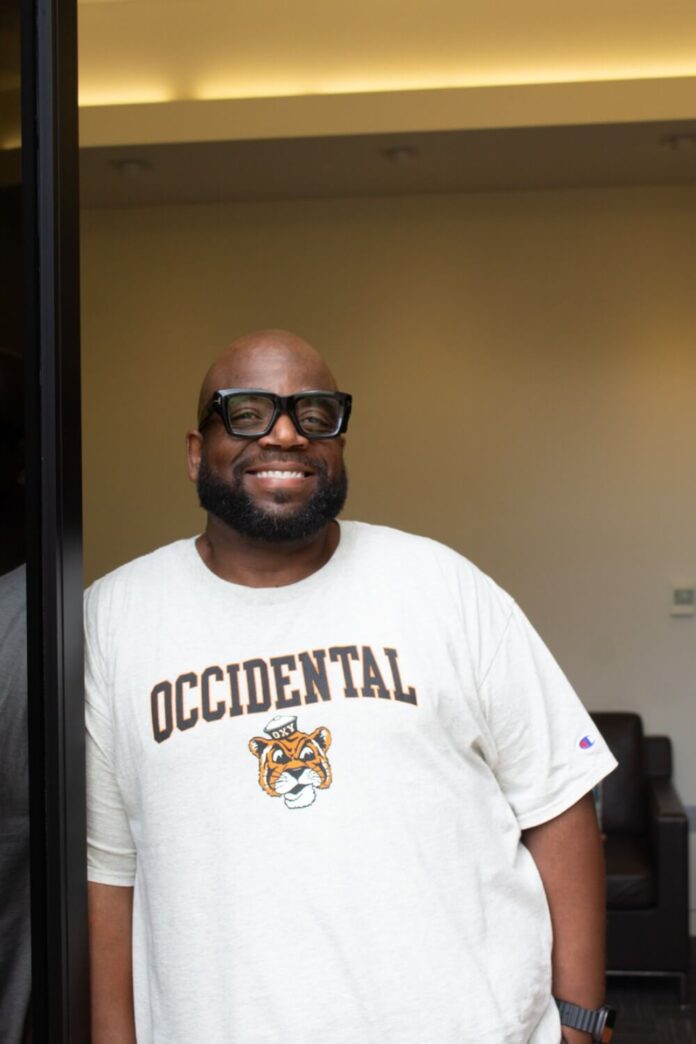
Warren Anderson, Occidental’s recent hire for Vice President for Community & Equity (VPCE), said he does not like the term DEI. He said he prefers to unlace the acronym, engaging with the dimensionality, importance and meaning each letter strings: Diversity; Equity; Inclusion.
Although new to Occidental, Anderson said he has long roots — 25 years deep — as a participant and service leader in higher education. Fresh out of his undergraduate program at Mansfield University, Anderson said he was immediately hired as the institution’s assistant director of admissions. Later, Anderson went on to earn a master’s degree in Multicultural Education and Urban Transformation from Eastern University and a doctorate in Education Administration and Leadership from Widener University. Throughout all his formal education, Anderson said his passion for matriculating aspiring college students persisted.
According to Anderson, most of his adult life has been dedicated to intentional service within educational institutions — from directing the oversight of strategic, inclusive incorporation of diversity across the five campuses of Harrisburg Area Community College, to being the Associate Provost for Student Success at Slippery Rock University and to serving as Assistant Vice President for Diversity and Inclusion at Clarkson University.
Anderson said he also worked within Pennsylvania State’s GEAR UP program. Serving 20,938 students across more than 40 schools, this federally-funded program aims to cultivate a college-bound mindset at the middle and high school levels, with a focus on increasing enrollment and first-year to second-year retention rates in post-secondary education.
“Getting students to see beyond their current circumstances and that life could be different than what they’re currently living through — that was both humbling and the most rewarding thing I’ve ever done,” Anderson said.
A native Philadelphian and older brother to four sisters, Anderson said he understands the vitality of education. Until September, Philadelphia held the title of being the “poorest big city in the U.S.,” and currently ranks second for the highest poverty rate amongst the 10 most populous cities in the country. Anderson said he and his sisters faced myriad hurdles during their upbringing in Philadelphia, making education a non-negotiable.
“The only way to get to where I wanted to go was through education,” Anderson said.
At a liberal arts institution, Anderson said students learn how to become critical thinkers in a global society. Since arriving in July, Anderson said the level of engagement from faculty, staff and students has stood out, making him confident that Occidental was the correct choice for the next stage of his life.
President Tom Stritikus said he recognized Anderson’s historic and current alignment with Occidental’s core values — excellence, equity, community and service — during the VPCE hiring process.
“Among many applicants, Dr. Anderson’s steadfast dedication to belonging and community, as well as the depth of his experience as a student-centered leader, stood out,” Stritikus said via email.
Former treasurer of the Diversity and Equity Board and student representative of Anderson’s search committee, Lani Young (sophomore), said she was looking for substance and sincerity to guide her evaluation of potential hires, and that in Anderson, she found both.
“With Dr. Anderson, what stood out was the way he consistently carried himself with openness and authenticity,” Lani said via email. “He spoke about leadership in a way that emphasized being accessible to students and visible on campus, while also building genuine trust across the community.”
While at Occidental, Anderson said his goal is to make everyone feel like they belong, regardless of identity, and that conversations catalyze this goal. Anderson said he strives to ensure everyone leaves a conversation with him knowing who he is, why he is here and that none of what he currently has was guaranteed. Above all, he said he wants time with others to be well spent.
Anderson enters Occidental under a federal administration that actively targets and dismantles diversity and inclusion programs, offices and personnel. However, he said these “anti-DEI” initiatives do not discourage him.
“I have an optimistic view of the things that are happening right now,” Anderson said.
According to Anderson, the Trump administration provides a platform for individuals to reveal themselves as prejudiced and biased. Anderson said he sees himself as a catalyst whose presence will allow all to be heard and who will solidify Occidental as a compassionate college populated by a respected, diverse student body.
“As a Black man, as a person of color, I don’t have the luxury of giving up,” Anderson said. “None of us have the luxury of giving up if we want to survive the times we’re in right now.”
According to Anderson, restorative practices that encourage dialogue across difference and tilling space for open conversation are essential. He said he hopes to inspire continual collaboration with Occidental’s world-class faculty, staff and engaged students.
Assistant Dean of Students and Director of Residential Education, Housing Services and Student Conduct, Isaiah Thomas said that staff and students are ready for such collaboration.
“I am grateful to have a thought partner in Dr. Anderson, whose impressive credentials and expertise make them an invaluable resource in fostering a welcoming and thriving environment for students, staff and faculty alike,” Thomas said via email.
Anderson said in order to traverse the current political climate, everyone must participate and engage where we previously would not. He said he hopes to harness resources the college already has to ensure every student feels safe and welcome to actively engage in the Occidental community.
“Things we do now, while we get to experience them, are not for us. They’re for the students who will be here in 10 years, 20 years, 30 years,” Anderson said. “If we do this right, and I think we have everything necessary for us to do it right, Oxy can be the blueprint for how colleges and universities all across this country use their voices to create cultural change.”
Contact Zoe Beauchamp at beauchamp@oxy.edu
![]()






























